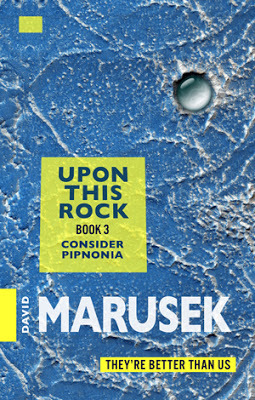David Marusek
Goodreads Author
Born
Buffalo, New York, The United States
Website
Twitter
Genre
Member Since
September 2011
To ask
David Marusek
questions,
please sign up.

|
Counting Heads (Counting Heads, #1)
—
published
2005
—
19 editions
|
|

|
Mind Over Ship
—
published
2009
—
11 editions
|
|

|
Getting to Know You
—
published
2007
—
9 editions
|
|

|
The Wedding Album
—
published
1999
—
2 editions
|
|

|
First Contact (Upon This Rock #1)
|
|

|
My Morning Glory and other flashes of absurd science fiction
—
published
2012
|
|

|
She Was Good--She Was Funny
—
published
2011
—
2 editions
|
|

|
L'Enfance attribuée
by
—
published
1995
—
3 editions
|
|

|
Glassing the Orgachine (Upon This Rock #2)
|
|

|
Consider Pipnonia
—
published
2021
—
2 editions
|
|
“…I tell you that loneliness itself is the secret. It’s a secret you cannot tell anyone. Why?
Because to confess your loneliness is to confess your failure as a human being. To confess would only cause others to pity and avoid you, afraid that what you have is catching. Your condition is caused by a lack of human relationship, and yet to admit to it only drives your possible rescuers farther away (while attracting cats).
So you attempt to hide your loneliness in public, to behave, in fact, as though you have too many friends already, and thus you hope to attract people who will unwittingly save you. But it never works that way. Your condition is written all over your face, in the hunch of your shoulders, in the hollowness of your laugh. You fool no one.
Believe me in this; I’ve tried all the tricks of the lonely man.”
―
Because to confess your loneliness is to confess your failure as a human being. To confess would only cause others to pity and avoid you, afraid that what you have is catching. Your condition is caused by a lack of human relationship, and yet to admit to it only drives your possible rescuers farther away (while attracting cats).
So you attempt to hide your loneliness in public, to behave, in fact, as though you have too many friends already, and thus you hope to attract people who will unwittingly save you. But it never works that way. Your condition is written all over your face, in the hunch of your shoulders, in the hollowness of your laugh. You fool no one.
Believe me in this; I’ve tried all the tricks of the lonely man.”
―
“There's not much to say about loneliness, for it's not a broad subject. Any child, alone in her room, can journey across its entire breadth, from border to border, in an hour.
Though not broad, our subject is deep. Loneliness is deeper than the ocean. But here, too, there is no mystery. Our intrepid child is liable to fall quickly to the very bottom without even trying. And since the depths of loneliness cannot sustain human life, the child will swim to the surface again in short order, no worse for wear.
Some of us, though, can bring breathing aids down with us for longer stays: imaginary friends, drugs and alcohol, mind-numbing entertainment, hobbies, ironclad routine, and pets. (Pets are some of the best enablers of loneliness, your own cuddlesome Murphy notwithstanding.) With the help of these aids, a poor sap can survive the airless depths of loneliness long enough to experience its true horror -- duration.
Did you know, Myren Vole, that when presented with the same odor (even my own) for a duration of only several minutes, the olfactory nerves become habituated -- as my daughter used to say -- to it and cease transmitting its signal to the brain?
Likewise, most pain loses its edge in time. Time heals all -- as they say. Even the loss of a loved one, perhaps life's most wrenching pain, is blunted in time. It recedes into the background where it can be borne with lesser pains. Not so our friend loneliness, which grows only more keen and insistent with each passing hour. Loneliness is as needle sharp now as it was an hour ago, or last week.
But if loneliness is the wound, what's so secret about it? I submit to you, Myren Vole, that the most painful death of all is suffocation by loneliness. And by the time I started on my portrait of Jean, I was ten years into it (with another five to go). It is from that vantage point that I tell you that loneliness itself is the secret. It's a secret you cannot tell anyone. Why?
Because to confess your loneliness is to confess your failure as a human being. To confess would only cause others to pity and avoid you, afraid that what you have is catching. Your condition is caused by a lack of human relationship, and yet to admit to it only drives your possible rescuers farther away (while attracting cats).
So you attempt to hide your loneliness in public, to behave, in fact, as though you have too many friends already, and thus you hope to attract people who will unwittingly save you. But it never works that way. Your condition is written all over your face, in the hunch of your shoulders, in the hollowness of your laugh. You fool no one.
Believe me in this; I've tried all the tricks of the lonely man.”
― Counting Heads
Though not broad, our subject is deep. Loneliness is deeper than the ocean. But here, too, there is no mystery. Our intrepid child is liable to fall quickly to the very bottom without even trying. And since the depths of loneliness cannot sustain human life, the child will swim to the surface again in short order, no worse for wear.
Some of us, though, can bring breathing aids down with us for longer stays: imaginary friends, drugs and alcohol, mind-numbing entertainment, hobbies, ironclad routine, and pets. (Pets are some of the best enablers of loneliness, your own cuddlesome Murphy notwithstanding.) With the help of these aids, a poor sap can survive the airless depths of loneliness long enough to experience its true horror -- duration.
Did you know, Myren Vole, that when presented with the same odor (even my own) for a duration of only several minutes, the olfactory nerves become habituated -- as my daughter used to say -- to it and cease transmitting its signal to the brain?
Likewise, most pain loses its edge in time. Time heals all -- as they say. Even the loss of a loved one, perhaps life's most wrenching pain, is blunted in time. It recedes into the background where it can be borne with lesser pains. Not so our friend loneliness, which grows only more keen and insistent with each passing hour. Loneliness is as needle sharp now as it was an hour ago, or last week.
But if loneliness is the wound, what's so secret about it? I submit to you, Myren Vole, that the most painful death of all is suffocation by loneliness. And by the time I started on my portrait of Jean, I was ten years into it (with another five to go). It is from that vantage point that I tell you that loneliness itself is the secret. It's a secret you cannot tell anyone. Why?
Because to confess your loneliness is to confess your failure as a human being. To confess would only cause others to pity and avoid you, afraid that what you have is catching. Your condition is caused by a lack of human relationship, and yet to admit to it only drives your possible rescuers farther away (while attracting cats).
So you attempt to hide your loneliness in public, to behave, in fact, as though you have too many friends already, and thus you hope to attract people who will unwittingly save you. But it never works that way. Your condition is written all over your face, in the hunch of your shoulders, in the hollowness of your laugh. You fool no one.
Believe me in this; I've tried all the tricks of the lonely man.”
― Counting Heads
“Why do we need so many people on Earth? I ask you. What are they good for? They live out ludicrous lives of pointless desperation. Ninety-nine percent of the human population is so much wasted resources. Stubborn vermin, we humans are.
Granted, in the past, the unwashed masses were necessary. We needed them to till our fields and fight our wars. We needed them to labor in our factories making consumer crap that we flipped back at them at a handsome profit.
Alas, those days are gone. We live in a boutique economy now. Energy is abundant and cheap. Mentars and robotic labor make and manage everything. So who needs people? People are so much dead white. They eat up our profits. They produce nothing but pollution and social unrest. They drive us crazy with their pissing and moaning. I think we can all agree that Corporation Earth is in need of a serious downsizing.
...
The boutique economy has no need of the masses, so let's get rid of them. But how, you ask? Not with wars, surely, or disease, famine, or mass murder. Despots have tried all these methods through the millennia, and they're never a permanent solution.
No, all we need to do is buy up the ground from under their feet -- and evict them. We're buying up the planet, Bishop, fair and square. We're turning it into the most exclusive gated community in history. Now, the question is, in two hundred years, will you be a member of the landowners club, or will you be living in some tin can in outer space drinking recycled piss?”
― Mind Over Ship
Granted, in the past, the unwashed masses were necessary. We needed them to till our fields and fight our wars. We needed them to labor in our factories making consumer crap that we flipped back at them at a handsome profit.
Alas, those days are gone. We live in a boutique economy now. Energy is abundant and cheap. Mentars and robotic labor make and manage everything. So who needs people? People are so much dead white. They eat up our profits. They produce nothing but pollution and social unrest. They drive us crazy with their pissing and moaning. I think we can all agree that Corporation Earth is in need of a serious downsizing.
...
The boutique economy has no need of the masses, so let's get rid of them. But how, you ask? Not with wars, surely, or disease, famine, or mass murder. Despots have tried all these methods through the millennia, and they're never a permanent solution.
No, all we need to do is buy up the ground from under their feet -- and evict them. We're buying up the planet, Bishop, fair and square. We're turning it into the most exclusive gated community in history. Now, the question is, in two hundred years, will you be a member of the landowners club, or will you be living in some tin can in outer space drinking recycled piss?”
― Mind Over Ship
Topics Mentioning This Author
 Goodreads Librarians Group
— 292562 members
— last activity 3 minutes ago
Goodreads Librarians Group
— 292562 members
— last activity 3 minutes ago
Goodreads Librarians are volunteers who help ensure the accuracy of information about books and authors in the Goodreads' catalog. The Goodreads Libra ...more

















































